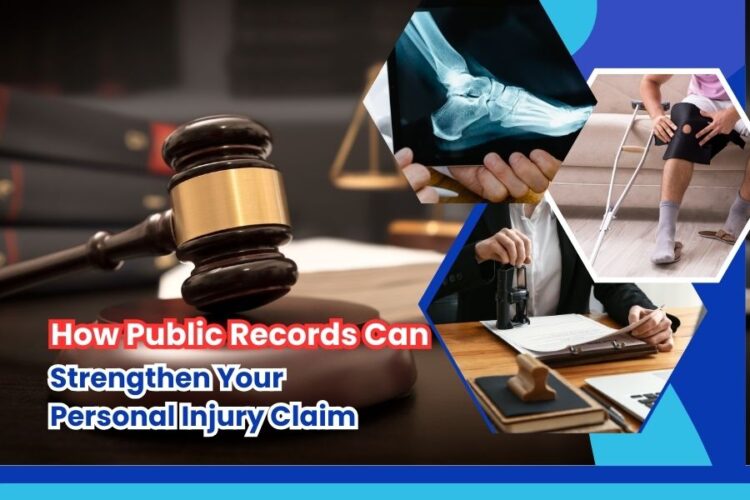Personal injury claims often hinge on the availability and strength of evidence. One vital source that many individuals overlook is public records. These documents, often accessible to the general public, can provide essential information that backs up a personal injury case, making them an invaluable resource for both individuals and legal professionals. In this article, we will explore how public records can bolster your personal injury claim.
Understanding the Importance of Public Records in Personal Injury Claims
Public records serve as a formal record of events, transactions, and legal proceedings. In the context of personal injury laws, they can play a significant role in establishing facts, understanding the context of the incident, and demonstrating accountability. Utilizing these records can make a marked difference in the strength and effectiveness of a claim.
The Role of Public Records in Legal Proceedings
In legal proceedings, public records can substantiate claims made by both parties. For instance, accident reports filed with law enforcement agencies provide detailed accounts of incidents, offering insights into how the event unfolded. Additionally, records related to previous violations or complaints against a defendant can demonstrate a pattern of behavior that may be crucial in establishing liability.
Furthermore, court records can provide information on past cases involving similar circumstances, which can be invaluable in framing your claim. Judges and juries rely heavily on documented evidence; thus, having robust public records can create a compelling narrative for your case. The credibility of these records often lends weight to the arguments presented, making it essential for claimants to gather as much relevant documentation as possible to support their position.
Types of Public Records Relevant to Personal Injury Claims
Numerous types of public records can be pertinent to personal injury claims. Below is a list of some key categories:
- Accident Reports: These documents detail incidents reported to law enforcement and include critical information like time, location, and witness details.
- Medical Records: Although health records are typically private, summaries or emergency room logs can serve as public records if released correctly, providing insights into the injuries sustained.
- Court Records: These documents include prior cases, judgments against defendants, and possible settlement figures that can inform your case.
- Property Records: These can reveal ownership details, zoning laws, and any history of complaints or code violations for the location where the injury occurred.
In addition to the aforementioned records, police logs, and dispatch records can also be crucial in personal injury cases. These documents may contain information about the response time of emergency services, any statements made by the involved parties at the scene, and even preliminary assessments made by officers regarding the fault. This can provide a clearer picture of the incident and potentially highlight negligence or misconduct.
Moreover, social media records and public posts can sometimes serve as informal evidence, revealing behaviors or statements that contradict claims made in court, thereby affecting the outcome of the case.
How to Access Public Records
Accessing public records has become more straightforward, thanks to advancements in technology. Here’s a breakdown of how to find these valuable resources.
Online Public Records Search
Many government agencies maintain online databases where you can search for public records. Websites for local government offices, state secretaries, or specific departments (like health or transportation) often provide searchable databases.
Requesting Records from Government Agencies
If the records you seek aren’t available online, you can request them directly from the appropriate government agency. This may involve filling out a formal request, providing identification, and paying a nominal fee. Be specific about the documents you require to expedite the process.
Additionally, understanding the Freedom of Information Act (FOIA) can be beneficial. This act allows you to request access to a wide range of federal documents, which can also include specific public records related to your personal injury claim.
Utilizing Public Records in Your Personal Injury Claim
Obtaining public records is just the first step; knowing how to use them effectively can significantly strengthen your case.
Establishing Liability with Public Records
Public records can be instrumental in establishing liability. For example, if a traffic accident occurred, accessing police reports might reveal which party was at fault, including citations issued to drivers involved.
Moreover, previous incidents reported at the same location can indicate a pattern of negligence, such as repeated accidents due to unsafe conditions. This type of information can be pivotal in proving that the responsible party had prior knowledge of risks associated with their actions or premises.
Using Public Records to Prove Damages
In addition to proving liability, public records can help substantiate damages. For instance, medical records will provide evidence of your injuries and treatment expenses. Moreover, accident reports can help detail lost wages if you were unable to work following the incident.
Accurate documentation from public records can thus play a crucial role in justifying the compensation amount you seek in your personal injury claim.
Legal Considerations When Using Public Records
While public records are a great asset, there are important legal considerations to keep in mind when using them in your case.
Privacy Concerns and Public Records
Though public records are generally accessible, privacy concerns can complicate their use. Sensitive information, such as personal addresses or medical details, may be redacted to protect individuals’ privacy. Always consider these aspects when seeking to utilize public records in your claim.
Admissibility of Public Records in Court
Not all public records are automatically admissible in court. For instance, hearsay rules can affect whether certain documents can be used as evidence. Understanding the rules of evidence and how they relate to public records is essential when preparing your case, so consulting with a legal professional can be invaluable.
The Limitations of Public Records in Personal Injury Claims
Despite their usefulness, public records do have limitations that claimants should be aware of.
Incomplete or Inaccurate Public Records
It’s crucial to recognize that public records can sometimes be incomplete or inaccurate. Errors in reporting or data management issues can lead to misinformation being recorded. Thoroughly checking multiple sources of information is vital to ensuring the data you rely on is accurate.
Time and Effort Required to Obtain Public Records
Finally, obtaining public records can be a time-consuming process. Depending on the agency, it may take considerable effort to gather all the necessary documentation. Planning and allowing sufficient time to collect records is essential to enhancing the efficacy of your personal injury claim.
In conclusion, public records can significantly strengthen your personal injury claim by providing essential documentation to establish liability, demonstrate damages, and support your case during legal proceedings. While there are challenges to consider, the potential benefits they offer make them a crucial element in any personal injury investigation.










